
Shravanabelagola is a town located near Channarayapatna of Hassan district in the Indian state of Karnataka and is 144 km (89 mi) from Bengaluru. The Gommateshwara Bahubali statue at Shravanabelagola is one of the most important tirthas in Digambar Jainism, one that reached a peak in architectural and sculptural activity under the patronage of Western Ganga dynasty of Talakad. Chandragupta Maurya is said to have died here in 298 BCE after he became a Digambar Jain monk and assumed an ascetic life style.

Sawai Madhopur district is a district of Rajasthan state in north-west India. Sawai Madhopur is the chief town and district headquarters. Sawai Madhopur district comes under Bharatpur division.

Sawai Madhopur is a city and Municipal Council in the Sawai Madhopur District in Rajasthan state, India. It is the administrative headquarters of Sawai Madhopur District of Rajasthan. Ranthambore National Park which is 7 km from the railway station and Ranthambore Fort, a UNESCO World Heritage Site are located near Sawai Madhopur.
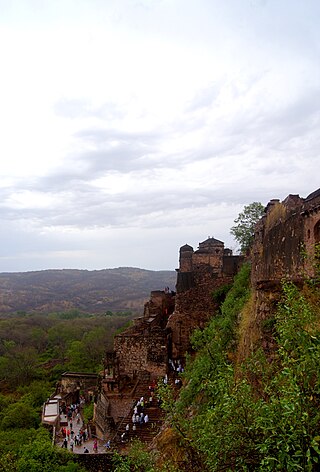
Ranthambore Fort lies within the Ranthambore National Park, near the city of Sawai Madhopur in Sawai Madhopur district of Rajasthan, India. the park being the former hunting grounds of the Maharajahs of Jaipur until the time of India's Independence. It is a formidable fort having been a focal point of the historical developments of Rajasthan. The fort is believed to be constructed by the Chahamanas. In the 13th century the Delhi Sultanate captured it for a brief time. The fort provides a panoramic view of the surrounding Ranthambore National Park and is now a popular tourist attraction.
This article lists monuments and sites of historic importance in Odisha, India.

Udayagiri and Khandagiri Caves, formerly called Kattaka Caves or Cuttack caves, are partly natural & partly artificial caves of archaeological, historical and religious importance near the city of Bhubaneswar in Odisha, India. The caves are situated on two adjacent hills, Udayagiri and Khandagiri mentioned as Kumari Parvata in the Hathigumpha inscription. They have a number of finely and ornately carved caves built during the 1st century BCE. It is believed that most of these caves were carved out as residential blocks for Jain monks during the reign of King Kharavela. Udayagiri means "Sunrise Hill" and has 18 caves while Khandagiri has 15 caves.

The culture of Rajasthan includes many artistic traditions that reflect the ancient Indian way of life. Rajasthan is also called "Land of Kings". It has many tourist attractions and facilities for tourists. This historical state of India attracts tourists and vacationers with its rich culture, tradition, heritage, and monuments. It also has some wildlife sanctuaries and national parks.
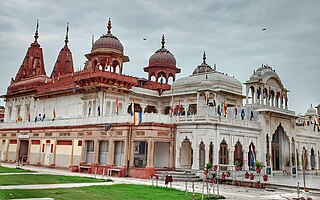
Shri Mahavir Ji is an important and prominent Jain pilgrimage site situated in Shri Mahaveerji town in Hindaun Block, Karauli district in Rajasthan. Given the importance of the religious place, the Indian Railways has specifically developed a railway station under West Central Railway zone by the name of Shri Mahaveerji railway station which is 10 minutes drive from the temple and temple authorities have arranged for regular buses from the station to the temple. The temple is visited by millions of Jain and Hindu devotees every year.
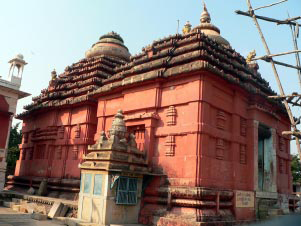
Digambara Jaina Temple is a Jain temple in Bhubaneswar, in the state of Odisha, India. The temple is on the top of Khandagiri hill. This hill is honeycombed with a series of rock-cut Jaina caves, commissioned by King Kharavela in the 1st century BCE. The rock-cut caves are protected by Archaeological Survey of India. The enshrining deities are a series of Jaina tirthankara images.
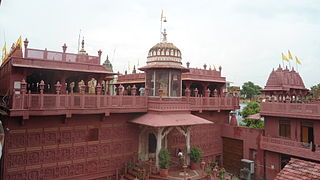
Shri Digamber Jain Atishya Kshetra Mandir, Sanghiji is an ancient Jain Temple in Sanganer, Rajasthan made of red stone. The ancient Shri Digamber Jain temple of Sanganer is 16 km from Jaipur.

Jain Basadi complex in Halebidu, Hassan district consists of three Digambar Jain Basadis dedicated to the Jain Tirthankars Parshvanatha, Shantinatha and Adinatha. The complex is situated near Kedareshwara temple and Dwarasamudra lake. These temples were constructed in the 12th century during the reign of Hoysala Empire along with Kedareshwara temple and Hoysaleswara Temple have been proposed to be listed under UNESCO World Heritage Site. The temple complex also includes a step well called Hulikere Kalyani.

Bhandasar Jain Temple or Bhanda Shah Jain temple, is a Digambar Jain temple located in Bikaner, Rajasthan. The temple is famous for wall painting and art work. This temple is protected by the Archaeological Survey of India.
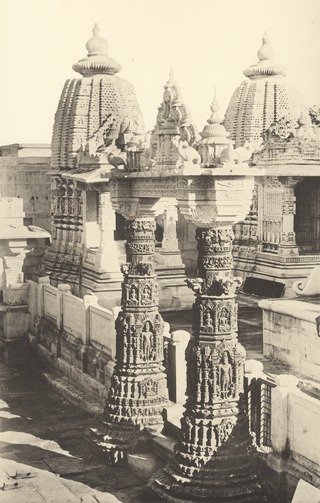
The Mahavira Jain temple is built in Osian of Jodhpur District, Rajasthan. The temple is an important pilgrimage of the Digambar Oswal Jain community. This temple is the oldest surviving Jain temple in Western India and was built during the reign of Mahārāja Śrī Vatsarāja of Imperial Pratihāras. The temple is visited by both Jain and Hindu.

The Naugaza Digambar Jain temple is situated near Naugaza in Alwar District, Rajasthan. The temple is situated near Neelkanth temple, Alwar.

Bajramath Temple is a Jain temple located in Gyaraspur town of Vidisha in state of Madhya Pradesh, India.

Pakbirra Jain temples is a group of three Jain temples in Pakbirra village in Purulia district of West Bengal.

Jaisalmer Fort Jain temples is a group of 7 Jain temples inside Jaisalmer Fort in state of Rajasthan. The Jaisalmer Fort is UNESCO World Heritage Site as part of Hill Forts of Rajasthan and is famous for its ancient Jain temples. The temples are well known for their intricate carvings and attract many tourists and religious devotees.
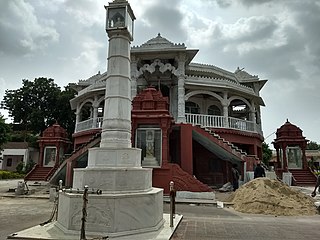
Bijolia Parshvanath Temple or Tapodaya Teerth Kshetra is a Jain pilgrimage center located in Bijolia town in Bhilwara district of Rajasthan.
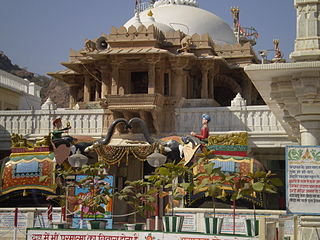
Nakodaji Tirth is a major Jain tirth in the Indian state of Rajasthan, located between the villages of Vikrampura and Nakoda in Barmer District.

Kesariyaji Tirth or Rishabhdeo Jain temple is a Jain temple located in Rishabhdeo town of Udaipur District of Indian state of Rajasthan. The temple is considered an important pilgrimage center by both Digambara and Śvētāmbara sect of Jainism.





















